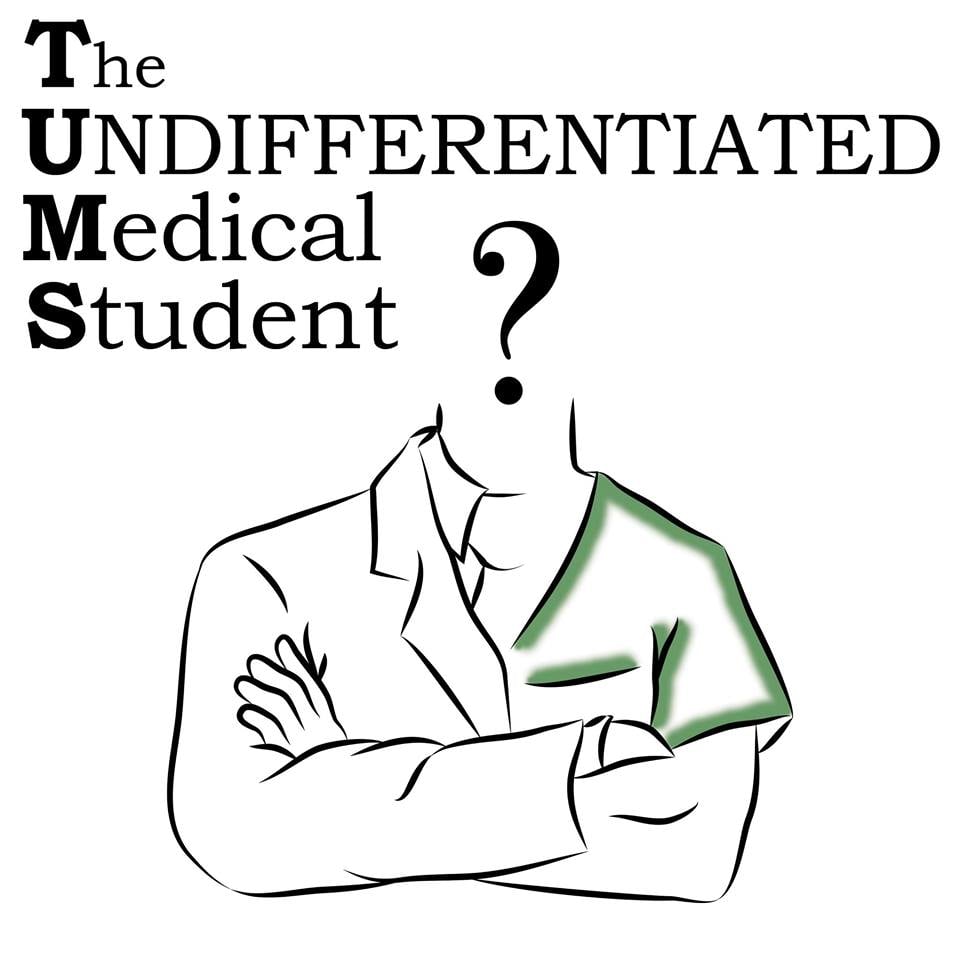Last Updated on June 26, 2022 by Laura Turner
What is the Undifferentiated Medical Student podcast? Give us an intro.
TUMS is an interview-based podcast about choosing a medical specialty and planning a career in medicine. Many medical students feel lost when it comes to picking a medical specialty and planning their careers (myself included). There are many reasons for this (and some I personally faced):
-they are overwhelmed by the number of options
-they may feel they don’t understand enough medicine yet to start the discussion
-they don’t have a mentor
The Undifferentiated Medical Student was created to champion these overwhelmed medical students and to empower them to start thinking about their future on their own. To accomplish this, TUMS is doing interviews with one physician from each of the 120+ specialties and subspecialties listed on the AAMC’s Careers in Medicine website with the aim of scaling the mentorship of these physicians so that any medical student struggling with career planning can benefit from their advice, thus enabling med students to start their own career planning thought process early, on their own, and in the privacy of their own ear buds.
Why did you decide to produce a podcast (as opposed to some other kind of media, like videos or a blog)?
I am obsessed with podcasts. In truth, what I’m actually obsessed with is audio. This obsession has to do with 1) what audio-based resources can communicate that purely visual ones (think: text-based resources) cannot, and 2) how audio-based resources can be consumed in ways that visual ones (think: text and video) cannot, especially by a busy medical student.
What audio can communicate: First and foremost, I decided to produce a podcast because there is a huge difference between *hearing* a passionate and knowledgeable physician speak about what they do, and simply reading a transcript of what was said. The listener can hear the excitement in the speaker’s voice, can hear when they pause to introspect or hesitate before answering. In short, the power of the spoken word is captured in audio.
How audio can be consumed: So why not video + audio? The reason has to do with the utility of audio by itself: with audio, you can listen while doing something else, like eating breakfast, walking to class, driving to a clinical rotation, and then doing the dishes when you get home. That is, audio can be consumed more efficiently than video. This has meant the world to me as a medical student when I’m cross-eyed from reading Harrison’s all day and I can’t bear the thought of reading anything else at all, or when I don’t have to time to watch a video because I’m on the go.
With audio, I can listen while both cross-eyed and on the go.
And it would be remiss of the medical student in me not to mention that you can also listen to audio on double speed. In fact, TUMS interviews are recorded with this fact in mind. The audio quality is high, and so you may listen at your preferred playback speed without subsequent distortion of the dialogue.
 How do you find the physicians you interview?
How do you find the physicians you interview?
Almost exclusively by referral from previous guests. Have you ever tried cold-calling a physician? Exactly. Now, have you ever tried cold-calling a physician for a 2-hr interview? Have fun. 🙂
🙂
How do you hope TUMS will impact the future of medicine?
Many years from now, it would be cool to hear someone in some random hospital corridor say “TUMS helped me plan my career”. That is to say, my hope is that TUMS will vastly increase the number of medical students (and thus residents, and thus attendings) who end up exactly where they want to be, doing exactly what they want to be doing, because they had a better understanding of where they wanted to go, from the beginning.
How do you balance your work on TUMS with your medical studies?
Good question, and the answer is “I don’t”. I am currently taking a gap year between my 3rd and 4th year of medical school to work on the podcast. And other things (I also work at a medical device startup).
How do you prepare for your interviews? What advice could you give a student preparing to shadow a physician who wants to ask insightful questions?
When I first started thinking about making this podcast, I sent out a bunch of Google forms to poll my classmates about the sorts of questions they would ask physicians if they could ask them anything. I got hundreds of responses, and, as I sifted through all of them, I noticed that many of them fell into 1 of 3 categories: 1) questions about the more objective information about a specialty, 2) questions about the more subjective process of determining a specialty was personally a good fit, and 3) questions about long-term career planning.
And these 3 categories of questions are now what make up the framework of the TUMS interview. So, if you are a med student looking for questions to ask a doctor while shadowing, you could start with the TUMS questions which I have online here.
Beyond that, I usually read about the guest’s specialty on the AAMC’s Careers in Medicine website. Even if you don’t listen to TUMS, if you are a med student, I recommend this website from the bottom of my heart. It is the closest thing we have to a one-stop-shop for information about many of the specialties that are out there.
What is a lesson you have learned from creating your podcast that will help you be a better physician?
A lesson that I have gleaned is that when you are excited about something (e.g., helping med students with career planning) and you provide some tangible manifestation of that excitement (e.g., a podcast) for others to see, you make it easier for others to join you in whatever you’re doing.
How will this make me a better physician? My corny answer is that I think I’ll be more willing to take the initiative again on a project in the future. In understanding that a substantial initial investment may be what’s necessary to get other people on board with what I’m doing, and that having other people on board with what I’m doing is what makes doing that thing fun, I think it will be easier for me to stomach the initial investment.
What advice do you have for students who want to have an impact on healthcare outside of the exam room or operating room?
Explore ways to harness the scaling power of the internet! For me, that’s been a podcast with a semi-decent website (all of which you can teach yourself to do in a couple of months, less!), but there are so many other ways to do this. The internet is a huge force multiplier when it comes to projecting your ideas, so learn how to harness it.
What do you envision for the future of TUMS?
I would like a expand the range of TUMS interviews beyond what is listed on the Careers in Medicine website to cover topics like how to set up a private practice, and to include alternative career paths, like working in the pharmaceutical industry; starting a medical device company or other business; partaking in health policy, consulting, etc.
There are literally a thousand interviews I could and want to do.
Anything else you want to share with SDN members?
Yes! There are a couple of other great career planning podcasts out there.
The first is Specialty Stories with Dr. Ryan Gray. Dr. Gray is the guy that runs medicalschoolhq.net and all those podcasts. TUMS and Specialty Stories are basically doing the exact same thing, so you should check out both.
The other podcast that I am especially fond of for career planning is The Doctor Paradox with Dr. Paddy Barrett, who’s probably a secret agent of one kind or another. That said, I doubt very much that Dr. Barrett would categorize his podcast as a “career planning” podcast. The Doctor Paradox explores the topic of physician burnout (the “paradox” of a career that promises to be so rewarding), as well as alternative career pathways as a means of helping this burned out physician rediscover his original passion for medicine. But, for me (Ian, the medical student), hearing about what physicians struggle with and then about the career changes they make to troubleshoot these issues, without a doubt constitutes career planning.
How can someone recommend a physician for you to interview?
By going here: www.undifferentiatedmedicalstudent.com/suggestions/
This podcast survives on referrals (from people who know potential guests well), as well as physicians who volunteer themselves for an interview, and a list of the specialties for which TUMS still needs guests can be found on the suggestions page listed above!
Ian Drummond is a 4th year medical student at a US medical school. Learn more and listen to his podcast at www.undifferentiatedmedicalstudent.com.
Do you know a student or resident doing something cool to advance healthcare? Let us know! Email us at editor@studentdoctor.net
